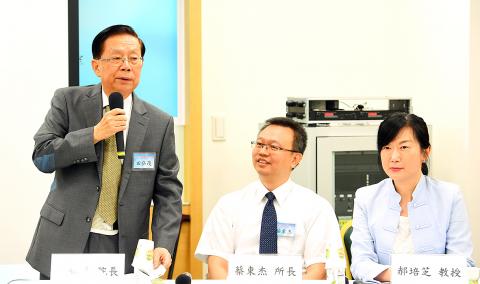The inclusion of Taiwan in China’s pending National Security Law means that China sees Taiwan as a major national security concern rather than as an internal affair or an issue of nationalism, suggesting that the issue is not up for compromise, academics told a forum hosted by the Institute for National Policy Research in Taipei yesterday.
After Chinese President Xi Jinping (習近平) last year expounded his outlook on Chinese national security, aiming to achieve the objectives in “eight dimensions and four stages,” China’s National People’s Congress began revising China’s National Security Law.
Article 11 of the law reportedly stipulates that protection of China’s sovereignty and territorial integrity is an obligation for all Chinese people, including the people of Hong Kong, Macau and Taiwan, and that no division is to be tolerated.

Photo: Lo Pei-der, Taipei Times
China has listed resolution of “the Taiwan issue” as one of its objectives in the proposed “third stage,” from 2021 to 2049, saying: “Appropriate measures must be taken to realize national unification and territorial integrity,” while including Taiwan in the law as part of its efforts toward achieving the goal, academics said.
For China, the nature of “the Taiwan issue” has changed from one sensitive to Chinese nationalism in the past to one that creates uncertainty about Chinese national security, because a separation of Taiwan divides Chinese sovereignty and territory and obstructs its plan to expand its maritime presence, National Taipei University professor Hao Pei-chih (郝培芝) said.
In view of the concerns, China is working on three fronts to resolve the issue, one of which is to “institutionalize” its claim that Taiwan is part of China by having Taiwan included in the National Security Law, launching the M503 commercial flight route and re-emphasizing its “Anti-Secession” Law, Hao said.
Meanwhile, China has continued to strengthen its armed forces while pushing for a military security coordination mechanism across the Taiwan Strait to counter the security alignment between the US and Japan, and to “decouple Taiwan from the alliance,” she said.
Tsai Yu-tai (蔡育岱), director of the Institute of Strategy and International Affairs at National Chung Cheng University, said the most salient element of Xi’s Taiwan policy is that he has produced what Tsai described as “a workable timetable” to resolve “the Taiwan issue.”
The characterization of Taiwan as an issue of national security concern to China marks a turning point in cross-strait relations, because it means that China considers its resolution imperative in response to changes in the international strategic environment, Tsai said.
That Taiwan is viewed as a national security concern paves the way for China to take military action against the nation.
It remains uncertain whether China would exercise its leverage over Taiwan through economic sanctions or launch attacks to resolve the issue, Tsai said.
“However, ‘securitization’ of the Taiwan issue has placed Taiwan in an even more difficult international environment because there will be no compromise with national security,” Tsai said.

‘DENIAL DEFENSE’: The US would increase its military presence with uncrewed ships, and submarines, while boosting defense in the Indo-Pacific, a Pete Hegseth memo said The US is reorienting its military strategy to focus primarily on deterring a potential Chinese invasion of Taiwan, a memo signed by US Secretary of Defense Pete Hegseth showed. The memo also called on Taiwan to increase its defense spending. The document, known as the “Interim National Defense Strategic Guidance,” was distributed this month and detailed the national defense plans of US President Donald Trump’s administration, an article in the Washington Post said on Saturday. It outlines how the US can prepare for a potential war with China and defend itself from threats in the “near abroad,” including Greenland and the Panama

A magnitude 4.9 earthquake struck off Tainan at 11:47am today, the Central Weather Administration (CWA) said. The hypocenter was 32.3km northeast of Tainan City Hall at a depth of 7.3km, CWA data showed. The intensity of the quake, which gauges the actual effect of a seismic event, measured 4 in Tainan and Chiayi County on Taiwan's seven-tier intensity scale, the data showed. The quake had an intensity of 3 in Chiayi City and County, and Yunlin County, while it was measured as 2 in Kaohsiung, Nantou County, Changhua County, Taitung County and offshore Penghu County, the data showed. There were no immediate reports of

The Chinese Nationalist Party (KMT) is maintaining close ties with Beijing, the Democratic Progressive Party (DPP) said yesterday, hours after a new round of Chinese military drills in the Taiwan Strait began. Political parties in a democracy have a responsibility to be loyal to the nation and defend its sovereignty, DPP spokesman Justin Wu (吳崢) told a news conference in Taipei. His comments came hours after Beijing announced via Chinese state media that the Chinese People’s Liberation Army’s Eastern Theater Command was holding large-scale drills simulating a multi-pronged attack on Taiwan. Contrary to the KMT’s claims that it is staunchly anti-communist, KMT Deputy

RESPONSE: The government would investigate incidents of Taiwanese entertainers in China promoting CCP propaganda online in contravention of the law, the source said Taiwanese entertainers living in China who are found to have contravened cross-strait regulations or collaborated with the Chinese Communist Party (CCP) could be subject to fines, a source said on Sunday. Several Taiwanese entertainers have posted on the social media platform Sina Weibo saying that Taiwan “must be returned” to China, and sharing news articles from Chinese state media. In response, the Mainland Affairs Council (MAC) has asked the Ministry of Culture to investigate whether the entertainers had contravened any laws, and asked for them to be questioned upon their return to Taiwan, an official familiar with the matter said. To curb repeated